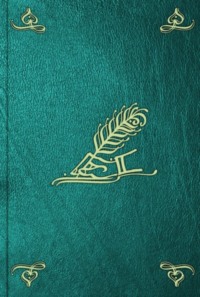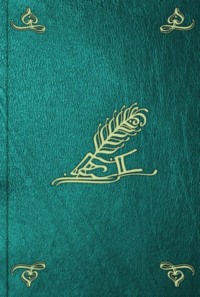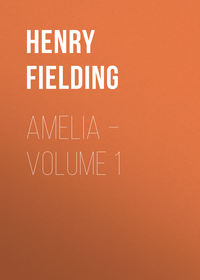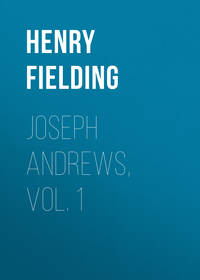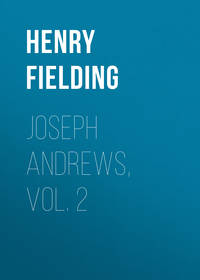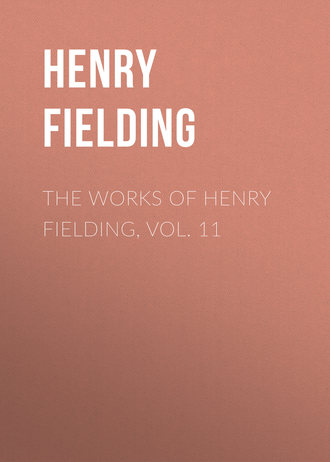 полная версия
полная версияThe Works of Henry Fielding, vol. 11
The beauteous spirit, perceiving her question gave offence, pursued it no farther. She had indeed all the sweetness and good-humour which are so extremely amiable (when found) in that sex which tenderness most exquisitely becomes. Her countenance displayed all the cheerfulness, the good-nature, and the modesty, which diffuse such brightness round the beauty of Seraphina,5 awing every beholder with respect, and, at the same time, ravishing him with admiration. Had it not been indeed for our conversation on the small-pox, I should have imagined we had been honoured with her identical presence. This opinion might have been heightened by the good sense she uttered whenever she spoke, by the delicacy of her sentiments, and the complacence of her behaviour, together with a certain dignity which attended every look, word, and gesture; qualities which could not fail making an impression on a heart6 so capable of receiving it as mine, nor was she long in raising in me a very violent degree of seraphic love. I do not intend by this, that sort of love which men are very properly said to make to women in the lower world, and which seldom lasts any longer than while it is making. I mean by seraphic love an extreme delicacy and tenderness of friendship, of which, my worthy reader, if thou hast no conception, as it is probable thou mayest not, my endeavour to instruct thee would be as fruitless as it would be to explain the most difficult problems of Sir Isaac Newton to one ignorant of vulgar arithmetic.
To return therefore to matters comprehensible by all understandings: the discourse now turned on the vanity, folly, and misery of the lower world, from which every passenger in the coach expressed the highest satisfaction in being delivered; though it was very remarkable that, notwithstanding the joy we declared at our death, there was not one of us who did not mention the accident which occasioned it as a thing we would have avoided if we could. Nay, the very grave lady herself, who was the forwardest in testifying her delight, confessed inadvertently that she left a physician by her bedside; and the gentleman who died of honour very liberally cursed both his folly and his fencing. While we were entertaining ourselves with these matters, on a sudden a most offensive smell began to invade our nostrils. This very much resembled the savour which travellers in summer perceive at their approach to that beautiful village of the Hague, arising from those delicious canals which, as they consist of standing water, do at that time emit odours greatly agreeable to a Dutch taste, but not so pleasant to any other. Those perfumes, with the assistance of a fair wind, begin to affect persons of quick olfactory nerves at a league’s distance, and increase gradually as you approach. In the same manner did the smell I have just mentioned, more and more invade us, till one of the spirits, looking out of the coach-window, declared we were just arrived at a very large city; and indeed he had scarce said so before we found ourselves in the suburbs, and, at the same time, the coachman, being asked by another, informed us that the name of this place was the City of Diseases. The road to it was extremely smooth, and, excepting the above-mentioned savour, delightfully pleasant. The streets of the suburbs were lined with bagnios, taverns, and cooks’ shops: in the first we saw several beautiful women, but in tawdry dresses, looking out at the windows; and in the latter were visibly exposed all kinds of the richest dainties; but on our entering the city we found, contrary to all we had seen in the other world, that the suburbs were infinitely pleasanter than the city itself. It was indeed a very dull, dark, and melancholy place. Few people appeared in the streets, and these, for the most part, were old women, and here and there a formal grave gentleman, who seemed to be thinking, with large tie-wigs on, and amber-headed canes in their hands. We were all in hopes that our vehicle would not stop here; but, to our sorrow, the coach soon drove into an inn, and we were obliged to alight.
Chapter iii
The adventures we met with in the City of DiseasesWE had not been long arrived in our inn, where it seems we were to spend the remainder of the day, before our host acquainted us that it was customary for all spirits, in their passage through that city, to pay their respects to that lady Disease, to whose assistance they had owed their deliverance from the lower world. We answered we should not fail in any complacence which was usual to others; upon which our host replied he would immediately send porters to conduct us. He had not long quitted the room before we were attended by some of those grave persons whom I have before described in large tie-wigs with amber-headed canes. These gentlemen are the ticket-porters in the city, and their canes are the insignia, or tickets, denoting their office. We informed them of the several ladies to whom we were obliged, and were preparing to follow them, when on a sudden they all stared at one another, and left us in a hurry, with a frown on every countenance. We were surprized at this behaviour, and presently summoned the host, who was no sooner acquainted with it than he burst into an hearty laugh, and told us the reason was, because we did not fee the gentlemen the moment they came in, according to the custom of the place. We answered, with some confusion, we had brought nothing with us from the other world, which we had been all our lives informed was not lawful to do. “No, no, master,” replied the host; “I am apprized of that, and indeed it was my fault. I should have first sent you to my lord Scrape,7 who would have supplied you with what you want.” “My lord Scrape supply us!” said I, with astonishment: “sure you must know we cannot give him security; and I am convinced he never lent a shilling without it in his life.” “No, sir,” answered the host, “and for that reason he is obliged to do it here, where he is sentenced to keep a bank, and to distribute money gratis to all passengers. This bank originally consisted of just that sum, which he had miserably hoarded up in the other world, and he is to perceive it decrease visibly one shilling a-day, till it is totally exhausted; after which he is to return to the other world, and perform the part of a miser for seventy years; then, being purified in the body of a hog, he is to enter the human species again, and take a second trial.” “Sir,” said I, “you tell me wonders: but if his bank be to decrease only a shilling a day, how can he furnish all passengers?” “The rest,” answered the host, “is supplied again; but in a manner which I cannot easily explain to you.” “I apprehend,” said I, “this distribution of his money is inflicted on him as a punishment; but I do not see how it can answer that end, when he knows it is to be restored to him again. Would it not serve the purpose as well if he parted only with the single shilling, which it seems is all he is really to lose?” “Sir,” cries the host, “when you observe the agonies with which he parts with every guinea, you will be of another opinion. No prisoner condemned to death ever begged so heartily for transportation as he, when he received his sentence, did to go to hell, provided he might carry his money with him. But you will know more of these things when you arrive at the upper world; and now, if you please, I will attend you to my lord’s, who is obliged to supply you with whatever you desire.”
We found his lordship sitting at the upper end of a table, on which was an immense sum of money, disposed in several heaps, every one of which would have purchased the honour of some patriots and the chastity of some prudes. The moment he saw us he turned pale, and sighed, as well apprehending our business. Mine host accosted him with a familiar air, which at first surprized me, who so well remembered the respect I had formerly seen paid this lord by men infinitely superior in quality to the person who now saluted him in the following manner: “Here, you lord, and be dam – d to your little sneaking soul, tell out your money, and supply your betters with what they want. Be quick, sirrah, or I’ll fetch the beadle to you. Don’t fancy yourself in the lower world again, with your privilege at your a – .” He then shook a cane at his lordship, who immediately began to tell out his money, with the same miserable air and face which the miser on our stage wears while he delivers his bank-bills. This affected some of us so much that we had certainly returned with no more than what would have been sufficient to fee the porters, had not our host, perceiving our compassion, begged us not to spare a fellow who, in the midst of immense wealth, had always refused the least contribution to charity. Our hearts were hardened with this reflection, and we all filled our pockets with his money. I remarked a poetical spirit, in particular, who swore he would have a hearty gripe at him: “For,” says he, “the rascal not only refused to subscribe to my works, but sent back my letter unanswered, though I am a better gentleman than himself.”
We now returned from this miserable object, greatly admiring the propriety as well as justice of his punishment, which consisted, as our host informed us, merely in the delivering forth his money; and, he observed, we could not wonder at the pain this gave him, since it was as reasonable that the bare parting with money should make him miserable as that the bare having money without using it should have made him happy.
Other tie-wig porters (for those we had summoned before refused to visit us again) now attended us; and we having fee’d them the instant they entered the room, according to the instructions of our host, they bowed and smiled, and offered to introduce us to whatever disease we pleased.
We set out several ways, as we were all to pay our respects to different ladies. I directed my porter to shew me to the Fever on the Spirits, being the disease which had delivered me from the flesh. My guide and I traversed many streets, and knocked at several doors, but to no purpose. At one, we were told, lived the Consumption; at another, the Maladie Alamode, a French lady; at the third, the Dropsy; at the fourth, the Rheumatism; at the fifth, Intemperance; at the sixth, Misfortune. I was tired, and had exhausted my patience, and almost my purse; for I gave my porter a new fee at every blunder he made: when my guide, with a solemn countenance, told me he could do no more; and marched off without any farther ceremony.
He was no sooner gone than I met another gentleman with a ticket, i. e., an amber-headed cane in his hand. I first fee’d him, and then acquainted him with the name of the disease. He cast himself for two or three minutes into a thoughtful posture, then pulled a piece of paper out of his pocket, on which he writ something in one of the Oriental languages, I believe, for I could not read a syllable: he bade me carry it to such a particular shop, and, telling me it would do my business, he took his leave.
Secure, as I now thought myself, of my direction, I went to the shop, which very much resembled an apothecary’s. The person who officiated, having read the paper, took down about twenty different jars, and, pouring something out of every one of them, made a mixture, which he delivered to me in a bottle, having first tied a paper round the neck of it, on which were written three or four words, the last containing eleven syllables. I mentioned the name of the disease I wanted to find out, but received no other answer than that he had done as he was ordered, and the drugs were excellent.
I began now to be enraged, and, quitting the shop with some anger in my countenance, I intended to find out my inn, but, meeting in the way a porter whose countenance had in it something more pleasing than ordinary, I resolved to try once more, and clapped a fee into his hand. As soon as I mentioned the disease to him he laughed heartily, and told me I had been imposed on, for in reality no such disease was to be found in that city. He then enquired into the particulars of my case, and was no sooner acquainted with them than he informed me that the Maladie Alamode was the lady to whom I was obliged. I thanked him, and immediately went to pay my respects to her.
The house, or rather palace, of this lady was one of the most beautiful and magnificent in the city. The avenue to it was planted with sycamore-trees, with beds of flowers on each side; it was extremely pleasant but short. I was conducted through a magnificent hall, adorned with several statues and bustoes, most of them maimed, whence I concluded them all to be true antiques; but was informed they were the figures of several modern heroes, who had died martyrs to her ladyship’s cause. I next mounted through a large painted staircase, where several persons were depictured in caricatura; and, upon enquiry, was told they were the portraits of those who had distinguished themselves against the lady in the lower world. I suppose I should have known the faces of many physicians and surgeons, had they not been so violently distorted by the painter. Indeed, he had exerted so much malice in his work, that I believe he had himself received some particular favours from the lady of this mansion: it is difficult to conceive a group of stranger figures. I then entered a long room, hung round with the pictures of women of such exact shapes and features that I should have thought myself in a gallery of beauties, had not a certain sallow paleness in their complexions given me a more distasteful idea. Through this I proceeded to a second apartment, adorned, if I may so call it, with the figures of old ladies. Upon my seeming to admire at this furniture, the servant told me with a smile that these had been very good friends of his lady, and had done her eminent service in the lower world. I immediately recollected the faces of one or two of my acquaintance, who had formerly kept bagnios; but was very much surprized to see the resemblance of a lady of great distinction in such company. The servant, upon my mentioning this, made no other answer than that his lady had pictures of all degrees.
I was now introduced into the presence of the lady herself. She was a thin, or rather meagre, person, very wan in the countenance, had no nose, and many pimples in her face. She offered to rise at my entrance, but could not stand. After many compliments, much congratulation on her side, and the most fervent expressions of gratitude on mine, she asked me many questions concerning the situation of her affairs in the lower world; most of which I answered to her intire satisfaction. At last, with a kind of forced smile, she said, “I suppose the pill and drop go on swimmingly?” I told her they were reported to have done great cures. She replied she could apprehend no danger from any person who was not of regular practice; “for, however simple mankind are,” said she, “or however afraid they are of death, they prefer dying in a regular manner to being cured by a nostrum.” She then expressed great pleasure at the account I gave her of the beau monde. She said she had herself removed the hundreds of Drury to the hundreds of Charing-cross, and was very much delighted to find they had spread into St James’s; that she imputed this chiefly to several of her dear and worthy friends, who had lately published their excellent works, endeavouring to extirpate all notions of religion and virtue; and particularly to the deserving author of the Bachelor’s Estimate; “to whom,” said she, “if I had not reason to think he was a surgeon, and had therefore written from mercenary views, I could never sufficiently own my obligations.” She spoke likewise greatly in approbation of the method, so generally used by parents, of marrying children very young, and without the least affection between the parties; and concluded by saying that, if these fashions continued to spread, she doubted not but she should shortly be the only disease who would ever receive a visit from any person of considerable rank.
While we were discoursing her three daughters entered the room. They were all called by hard names; the eldest was named Lepra, the second Chæras, and the third Scorbutia.8 They were all genteel, but ugly. I could not help observing the little respect they paid their parent, which the old lady remarking in my countenance, as soon as they quitted the room, which soon happened, acquainted me with her unhappiness in her offspring, every one of which had the confidence to deny themselves to be her children, though she said she had been a very indulgent mother and had plentifully provided for them all. As family complaints generally as much tire the hearer as they relieve him who makes them, when I found her launching farther into this subject I resolved to put an end to my visit, and, taking my leave with many thanks for the favour she had done me, I returned to the inn, where I found my fellow-travellers just mounting into their vehicle. I shook hands with my host and accompanied them into the coach, which immediately after proceeded on its journey.
Chapter iv
Discourses on the road, and a description of the palace of DeathWE were all silent for some minutes, till, being well shaken into our several seats, I opened my mouth first, and related what had happened to me after our separation in the city we had just left. The rest of the company, except the grave female spirit whom our reader may remember to have refused giving an account of the distemper which occasioned her dissolution, did the same. It might be tedious to relate these at large; we shall therefore only mention a very remarkable inveteracy which the Surfeit declared to all the other diseases, especially to the Fever, who, she said, by the roguery of the porters, received acknowledgments from numberless passengers which were due to herself. “Indeed,” says she, “those cane-headed fellows” (for so she called them, alluding, I suppose, to their ticket) “are constantly making such mistakes; there is no gratitude in those fellows; for I am sure they have greater obligations to me than to any other disease, except the Vapours.” These relations were no sooner over than one of the company informed us we were approaching to the most noble building he had ever beheld, and which we learnt from our coachman was the palace of Death. Its outside, indeed, appeared extremely magnificent. Its structure was of the Gothic order; vast beyond imagination, the whole pile consisting of black marble. Rows of immense yews form an amphitheatre round it of such height and thickness that no ray of the sun ever perforates this grove, where black eternal darkness would reign was it not excluded by innumerable lamps which are placed in pyramids round the grove; so that the distant reflection they cast on the palace, which is plentifully gilt with gold on the outside, is inconceivably solemn. To this I may add the hollow murmur of winds constantly heard from the grove, and the very remote sound of roaring waters. Indeed, every circumstance seems to conspire to fill the mind with horrour and consternation as we approach to this palace, which we had scarce time to admire before our vehicle stopped at the gate, and we were desired to alight in order to pay our respects to his most mortal majesty (this being the title which it seems he assumes). The outward court was full of soldiers, and, indeed, the whole very much resembled the state of an earthly monarch, only more magnificent. We past through several courts into a vast hall, which led to a spacious staircase, at the bottom of which stood two pages, with very grave countenances, whom I recollected afterwards to have formerly been very eminent undertakers, and were in reality the only dismal faces I saw here; for this palace, so awful and tremendous without, is all gay and sprightly within; so that we soon lost all those dismal and gloomy ideas we had contracted in approaching it. Indeed, the still silence maintained among the guards and attendants resembled rather the stately pomp of eastern courts; but there was on every face such symptoms of content and happiness that diffused an air of chearfulness all round. We ascended the staircase and past through many noble apartments whose walls were adorned with various battle-pieces in tapistry, and which we spent some time in observing. These brought to my mind those beautiful ones I had in my lifetime seen at Blenheim, nor could I prevent my curiosity from enquiring where the Duke of Marlborough’s victories were placed (for I think they were almost the only battles of any eminence I had read of which I did not meet with); when the skeleton of a beef-eater, shaking his head, told me a certain gentleman, one Lewis XIV., who had great interest with his most mortal majesty, had prevented any such from being hung up there. “Besides,” says he, “his majesty hath no great respect for that duke, for he never sent him a subject he could keep from him, nor did he ever get a single subject by his means but he lost 1000 others for him.” We found the presence-chamber at our entrance very full, and a buz ran through it, as in all assemblies, before the principal figure enters; for his majesty was not yet come out. At the bottom of the room were two persons in close conference, one with a square black cap on his head, and the other with a robe embroidered with flames of fire. These, I was informed, were a judge long since dead, and an inquisitor-general. I overheard them disputing with great eagerness whether the one had hanged or the other burnt the most. While I was listening to this dispute, which seemed to be in no likelihood of a speedy decision, the emperor entered the room and placed himself between two figures, one of which was remarkable for the roughness, and the other for the beauty of his appearance. These were, it seems, Charles XII. of Sweden and Alexander of Macedon. I was at too great a distance to hear any of the conversation, so could only satisfy my curiosity by contemplating the several personages present, of whose names I informed myself by a page, who looked as pale and meagre as any court-page in the other world, but was somewhat more modest. He shewed me here two or three Turkish emperors, to whom his most mortal majesty seemed to express much civility. Here were likewise several of the Roman emperors, among whom none seemed so much caressed as Caligula, on account, as the page told me, of his pious wish that he could send all the Romans hither at one blow. The reader may be perhaps surprized that I saw no physicians here; as indeed I was myself, till informed that they were all departed to the city of Diseases, where they were busy in an experiment to purge away the immortality of the soul.
It would be tedious to recollect the many individuals I saw here, but I cannot omit a fat figure, well drest in the French fashion, who was received with extraordinary complacence by the emperor, and whom I imagined to be Lewis XIV. himself; but the page acquainted me he was a celebrated French cook.
We were at length introduced to the royal presence, and had the honour to kiss hands. His majesty asked, us a few questions, not very material to relate, and soon after retired.
When we returned into the yard we found our caravan ready to set out, at which we all declared ourselves well pleased; for we were sufficiently tired with the formality of a court, notwithstanding its outward splendour and magnificence.
Chapter v
The travellers proceed on their journey, and meet several spirits who are coming into the fleshWE now came to the banks of the great river Cocytus, where we quitted our vehicle, and past the water in a boat, after which we were obliged to travel on foot the rest of our journey; and now we met, for the first time, several passengers travelling to the world we had left, who informed us they were souls going into the flesh.
The two first we met were walking arm-in-arm, in very close and friendly conference; they informed us that one of them was intended for a duke, and the other for a hackney-coachman. As we had not yet arrived at the place where we were to deposit our passions, we were all surprized at the familiarity which subsisted between persons of such different degrees; nor could the grave lady help expressing her astonishment at it. The future coachman then replied, with a laugh, that they had exchanged lots; for that the duke had with his dukedom drawn a shrew for a wife, and the coachman only a single state.
As we proceeded on our journey we met a solemn spirit walking alone with great gravity in his countenance: our curiosity invited us, notwithstanding his reserve, to ask what lot he had drawn. He answered, with a smile, he was to have the reputation of a wise man with £100,000 in his pocket, and was practising the solemnity which he was to act in the other world.


